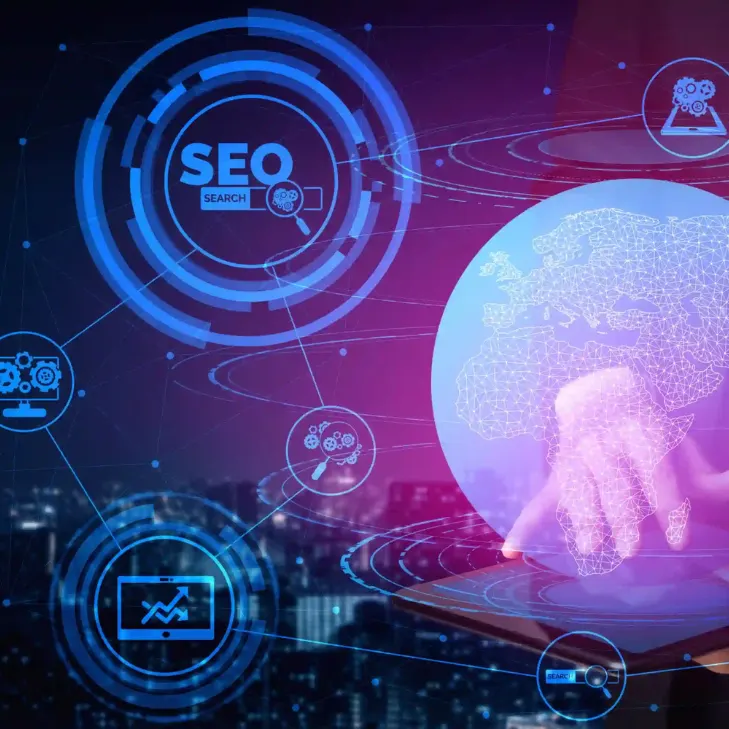

As the ever-changing online landscape takes its course, there's only one that remains unchanging—the need for SEO to thrive online. Stepping into 2025 even deeper, search engines are smarter, customers are more discerning, and businesses have to adapt faster than ever before to reign supreme. For the best ranking, more traffic, and greater brand visibility, it's crucial to keep adapting with changing SEO trends.
Here are the 7 best SEO trends you should be on the lookout for in 2025 so that you can harness your online presence:
1. AI-Driven Search is the New Normal
Search engines like Google are using AI algorithms, RankBrain and MUM, to interpret context, user intent, and semantics better than ever. Keyword stuffing is history, and answerable content is the doorway to being. To remain in the times, produce content that's natural, informative, and closest to user intent possible, not search words.
2. Voice Search Optimization is Booming
With the rise of smart assistants such as Alexa, Siri, and Google Assistant in home appliances, voice search is increasing. People now search in full queries rather than as a series of fragmented keywords. Optimize for conversational search and maintain natural language in your content. Have FAQ sections to attract voice search traffic well also.
3. User Experience (UX) is a Ranking Factor
Google's Core Web Vitals update has already impacted page speed, interactivity, and visual stability—and UX precedence will only increase in 2025. Keep your website loading quickly, running flawlessly on any platform, and delivering an exceptional experience. An excellent one holds visitors to your site longer and increases your ranking.
4. Video Content Optimization is Important
Video is no longer a choice—it's an SEO necessity. From tutorials and reviews to behind-the-scenes brand videos, multimedia keeps people engaged on the page. Descriptive titles, captions, and structured data optimize your vids. Host on platforms like YouTube (owned by Google) and you can even get into featured video snippets.
5. Mobile-First Indexing is Now the Normal
Google. It has finally fully moved to mobile-first indexing, where it uses the mobile version of your site for search rankings. Your site should look responsive and mobile-friendly if it doesn't already. Prioritize mobile usability, fast loading speeds, and a intuitive interface constructed thumb-friendly rather than click-friendly.
6. E-E-A-T Is More Important Than Ever
Google continues to prioritize content showing Experience, Expertise, Authoritativeness, and Trustworthiness (E-E-A-T) above all else. This is particularly on pages providing finance, health, or legal advice. Employ author profiles, cite verified sources, and maintain consistent and accurate content in order to establish your authority.
7. Search Intent is the Backbone of SEO
Having an idea of why somebody is searching is just as vital as having an idea of what they are searching for. Are your users searching for information, a product, or a solution? Optimize for it. Talk about pain points, provide clear calls-to-action, and organize your content around what your users really want.
Final Thoughts
SEO in 2025 is smarter, more user-focused, and more dynamic than ever before. By embracing these trends—AI, voice search, UX, video content, mobile-first design, E-E-A-T, and intent-driven strategy—you’ll position your brand for stronger online visibility and long-term growth.
Remember, SEO isn’t just about ranking higher; it’s about delivering real value to your audience. Stay ahead of the curve, and search engines will reward you.

In today's quick-paced business landscape of 2025, building a robust brand image extends far beyond digital campaigns. Brands now require more personal, interactive, and shareable experiences to engage with their audience—and corporate events and promotions are one of the best methods to do so.
These are not longer such things as promotions and meetings—these are crafted experiences designed to initiate dialogue, breed loyalty, and make a lasting impression on clients, partners, and prospects alike.
Why Corporate Events Are Crucial to Today's Brands
Corporate functions offer a great chance for organizations to turn their identity into reality in an experiential yet true manner. From product launches and yearly conferences to awards events and team off-sites, all of them are a tangible embodiment of your brand's voice, values, and vision.
In 2025, personalization and creativity power winning event strategies. Audiences no longer desire passive experiences—now they expect interactive, immersive, shareable experiences that outlast the event itself. This emotional connection is what distinguishes your company in people's memories.
Strategic Promotions That Leave a Mark
Promotion is the key to your event and human beings. Without proper promotional strategy, the well-organized event could go unnoticed. The 2025 trick is to cross utilize online as well as offline methods of promotion to get maximum out of your expenses.
Let's see how shrewd promotion builds brand awareness:
It's not merely selling the event—selling the story, values, and products or services of your business in a relevant, consistent, and valuable way to your target audience
Developing Brand Awareness Through Experiences
When your customers, clients, or partners attend your event and depart with a favorable, long-lasting impression, they inevitably start linking that with your brand. This is the equivalent of word-of-mouth, trust development, and brand recognition, all of which are critical to sustained business development.
Bringing your brand identity to the event from signage and decoration to digital media and messaging assists in supporting recognition in subtle but efficient ways.
Apart from it, in 2025 with technologies such as AR, VR, and live streaming blended into one, events can be scaled out to more people without sacrificing personalization—uniting digital scalability with emotional connection.
Final Thoughts
Corporate event and activation strategy is no longer a luxury—it's an essential tool for creating brand awareness in a meaningful and sustainable manner. In a world where consumers demand authentic experiences and genuine connections, brands that make strategic, creative, and immersive events an investment will be at the forefront of discussion within their markets.
Whether launching a product, marking a milestone, or merely engaging with your audience—make your brand unmissable. Because in 2025, it's no longer about being noticed. It's about remembering you.

When it comes to corporate travel planning or hosting large business events, it's the little things that count the most. Logistics and accommodations to entertainment and transportation, every aspect has to fall seamlessly into place. That's where destination management enters the picture—a robust, behind-the-scenes solution that's revolutionizing the way businesses plan and deliver seamless events.
In 2025, more companies are coming to Destination Management Companies (DMCs) to introduce efficiency, local knowledge, and creativity into corporate travel and event planning. What's the outcome? Stand-out experiences, hassle-free delivery, and events that make a company proud.
What is Destination Management?
Destination management is the art (and science) of organizing every detail of an event or business trip to a specific destination. A destination management company is your local insider, taking care of everything from venue selection and transportation to team-building experiences, catering, on-site personnel, and cultural immersion.
Instead of attempting to arrange all of this remotely, companies work with DMCs to simplify planning and execution—particularly in foreign cities or countries.
Why It Matters to Corporate Events and Travel
Whether you're planning an international convention, an incentive journey, or a high-profile client meeting, the last thing you need is surprise glitches. When you hire a DMC, you're not merely contracting a service provider—you're acquiring an experienced partner with insider knowledge of the local market, vendor ties, and cultural subtleties that can trip up even the best events.
Here's how destination management adds value
The Experience Factor
In 2025, corporate events are no longer merely about ticking boxes—they're about creating experiences. From cultural outings and culinary events specifically curated to dining add-ons, technology immersion displays, and wellness add-ons, destination management puts that extra value on the table.
Picture having a leadership retreat in a European heritage property, or a product launch on a rooftop overlooking a city skyline—everything orchestrated right down to the final detail, with local flair infused into every interaction. That's the spell that a DMC can cast.
Final Thoughts
If your company is spending money on corporate events or travel, don't leave it up to luck. Destination management is the magic ingredient that turns average trips into memorable brand experiences.
By working with people who understand the ins and outs of your destination, you open the door to easier planning, improved outcomes, and more satisfied participants. And in business, a successful event doesn't just impress—it makes a lasting impression.

In today’s hyper-connected world, your website is no longer just a digital business card; it’s your brand’s most powerful ambassador. It works tirelessly, 24/7, to attract, engage, and convert your audience.
At Kreatz, a leading advertising agency in Kochi, we understand that exceptional web development is more than just design — it’s the foundation of a strong, future-ready brand identity.
The digital era has transformed how businesses connect with customers. For most people, your website is the first impression they have of your brand, and as the saying goes, you never get a second chance to make a first impression.
A poorly designed or slow-loading website can drive visitors away in seconds. But a high-performing, visually stunning, and user-friendly website can turn casual visitors into loyal brand advocates.
That’s why web development today isn’t just a technical process; it’s a strategic investment in your brand’s long-term growth.
At Kreatz, we believe great web development balances creativity and performance. Every project we build focuses on four essential pillars:
In Kochi’s vibrant digital landscape, Kreatz stands out for its ability to merge creativity with technology. We’re not just developers who code; we’re storytellers, strategists, and designers who build immersive digital experiences that align with your brand goals.
Our collaborative approach ensures every website reflects the client’s voice, values, and vision. From initial concept to final launch, we make the process transparent, seamless, and results-driven.
Technology moves fast, and so do we. The Kreatz team stays ahead by leveraging cutting-edge frameworks and tools.
Responsive Design & Progressive Web Apps (PWAs) for optimal mobile performance.
E-commerce and CMS Solutions tailored to specific business needs.
Custom Integrations that enhance automation, analytics, and scalability.
We don’t believe in one-size-fits-all solutions. Every business is unique, and so should be its digital presence.
In the same way that corporate events bring brands to life through real-world experiences, a well-developed website brings your brand to life online.
Both serve a shared goal: to make your brand memorable.
A thoughtfully developed website communicates your story, values, and promises in every pixel. It becomes the digital counterpart of your physical brand experiences — an always-on event that builds recognition, trust, and loyalty.
In 2025 and beyond, brand success hinges on how effectively you blend creativity, strategy, and technology.
At Kreatz, the most trusted advertising agency in Kochi, we don’t just build websites — we craft digital experiences that define your brand’s future. Whether you’re a startup shaping your first impression or an established business seeking transformation, your digital success story begins here.
Kreatz — Crafting Digital Excellence in Kochi